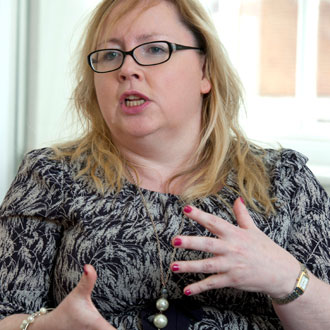Dr Charlotte Jones: ‘Urgent care needs to be reviewed to ensure it works for patients’

We meet Dr Charlotte Jones on a crisp winter’s day at BMA House. Dr Jones leads the urgent care brief at GPC, and we speak on the day that she issues a clarion call for an urgent reassessment of the NHS 111 phone line in England.
The winter crisis in NHS emergency care continues to rumble on, and Dr Jones is admirably trying to turn the media attention towards the pressure on other parts of the health system.
‘What the BMA is calling for is a recognition that the amount of workload generated by NHS 111 has gone up,’ she says. ‘It is probably indicative of the under resourcing of general practice in general, but we need to look at the whole unscheduled care system to make sure it works for patients.’
Her call is mired in some miscalculations around the figures used by the BMA – they claim a 186% increase in NHS 111 calls, which turns out to be incorrect – but it is good to see Dr Jones outlining an ambitious agenda to revolutionise the way urgent care works.
‘Nobody is [looking at] the system as a whole and coming up with what a system of unscheduled care at the front end looks like.
‘This is something that I’m extremely keen to take forward with GPC, getting the key people in the room, looking at the key documents and saying: OK, so what does this mean if we’re going to deliver a front-ended service, from primary care through into the front-end of the emergency department?”’
And Dr Jones has picked a good time to make this move. The pressure on emergency services has pushed the NHS in all UK countries to reassess urgent care. For example, in England, Pulse recently revealed that managers have ordered NHS 111 providers to employ GPs to triage calls.
She says: ‘We’ve seen more pressure over the winter, significantly more than in previous years, but this has been seen across the whole year.
‘What I would say, within Wales, is that the under investment in GP out-of-hours services is certainly coming home to bear now in terms of the resilience of those organisations to provide high-quality unscheduled care for Welsh patients.
‘We need to see further investment in that, as they are critical to providing good quality care for patients, and reduce pressure on other parts of the unscheduled care system. ‘
Dr Jones ‘ other job is chair of GPC Wales. She is in the midst of contract negotiations and says her priority – using the three-year deal in Scotland as a model – is greater stability for practices.
She says: ‘Instead of this never-ending annual round of everything being thrown up in the air like a pack of cards, and then coping with however it falls … we’re hoping for a period of stability, and Welsh government have heard our calls for that.’
The Welsh government recently promised a recurring investment of £10m pounds for primary care, with £6m to kickstart the development of practice ‘clusters’ which will see practices sharing back-office functions and improving care co-ordination, and could in future see clusters managing community staff, and taking on delegated budgets.
She says: ‘Some clusters are ahead of the game, which is fantastic, [but] in other parts of Wales the progress has been much slower. Certainly, our contract is focussing on where we can enable those clusters that are a little bit further ahead in the game to have more resource, to let them take further action.’
Dr Jones has been successful in delivering significant new investment into general practice – in addition to the £10m additional recurrent funds for primary care, the Welsh Government has also promised £30m for primary and community care projects. Ideas, such as central support for OOH indemnity costs, have been started in Wales and then subsequently adopted by NHS England.
She says that it has been hard work, but that the Welsh government is beginning to recognise general practice needs sustainable funding, rather than gimmicks, to improve care.
She says: ‘Sustainable funding is absolutely critical. It has taken some time to come through, but the [Welsh] health minister is very, very wedded to making primary and community care his focus. Which is why we’ve been lucky enough to be allocated a significant amount of recurring funding for the next four years. Hopefully, NHS England will follow suit.’
Pulse October survey
Take our July 2025 survey to potentially win £1.000 worth of tokens











